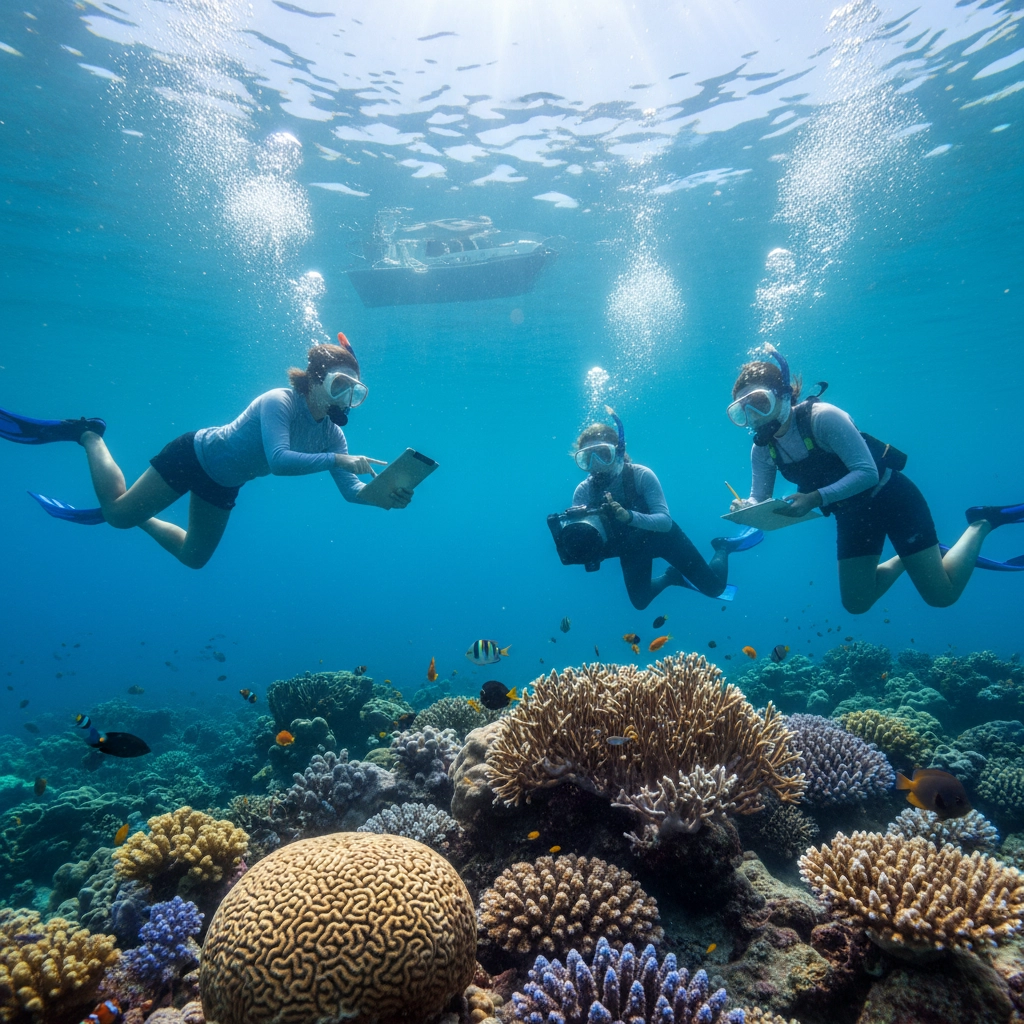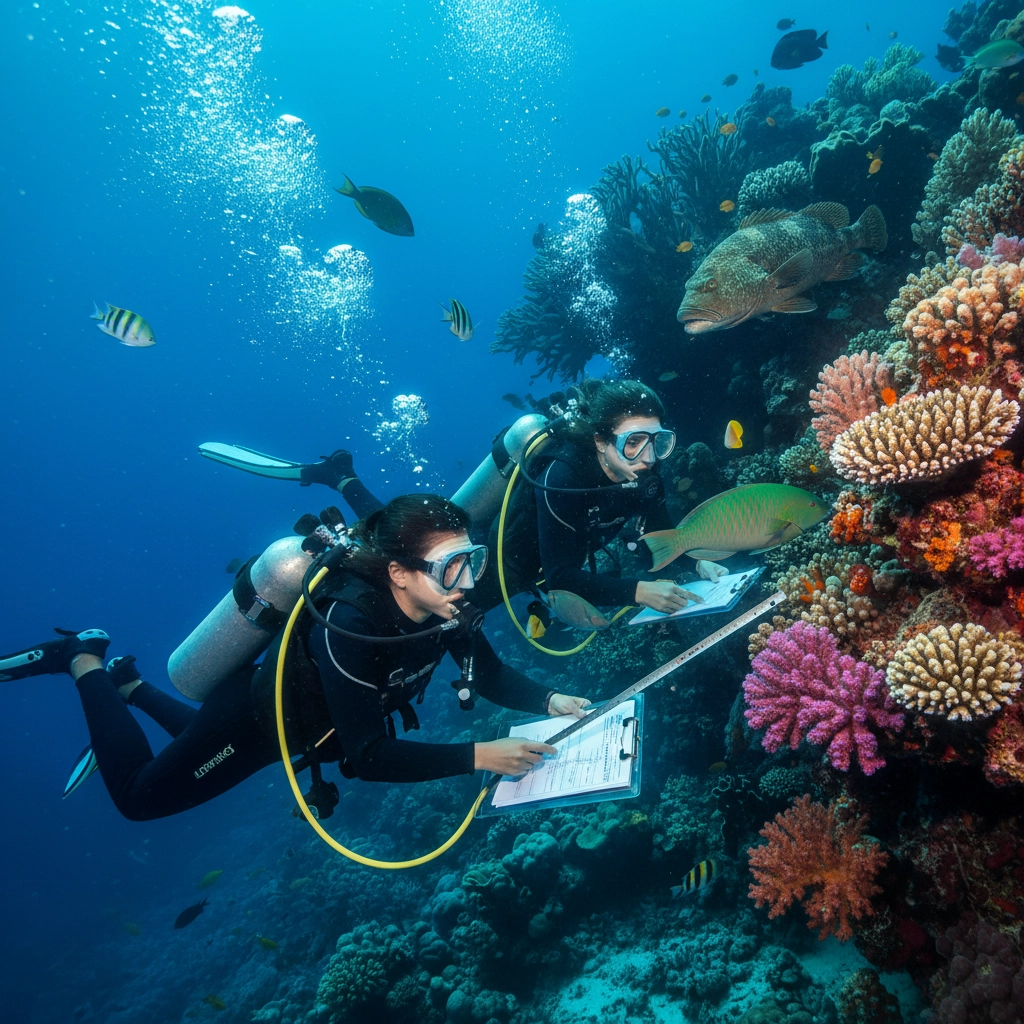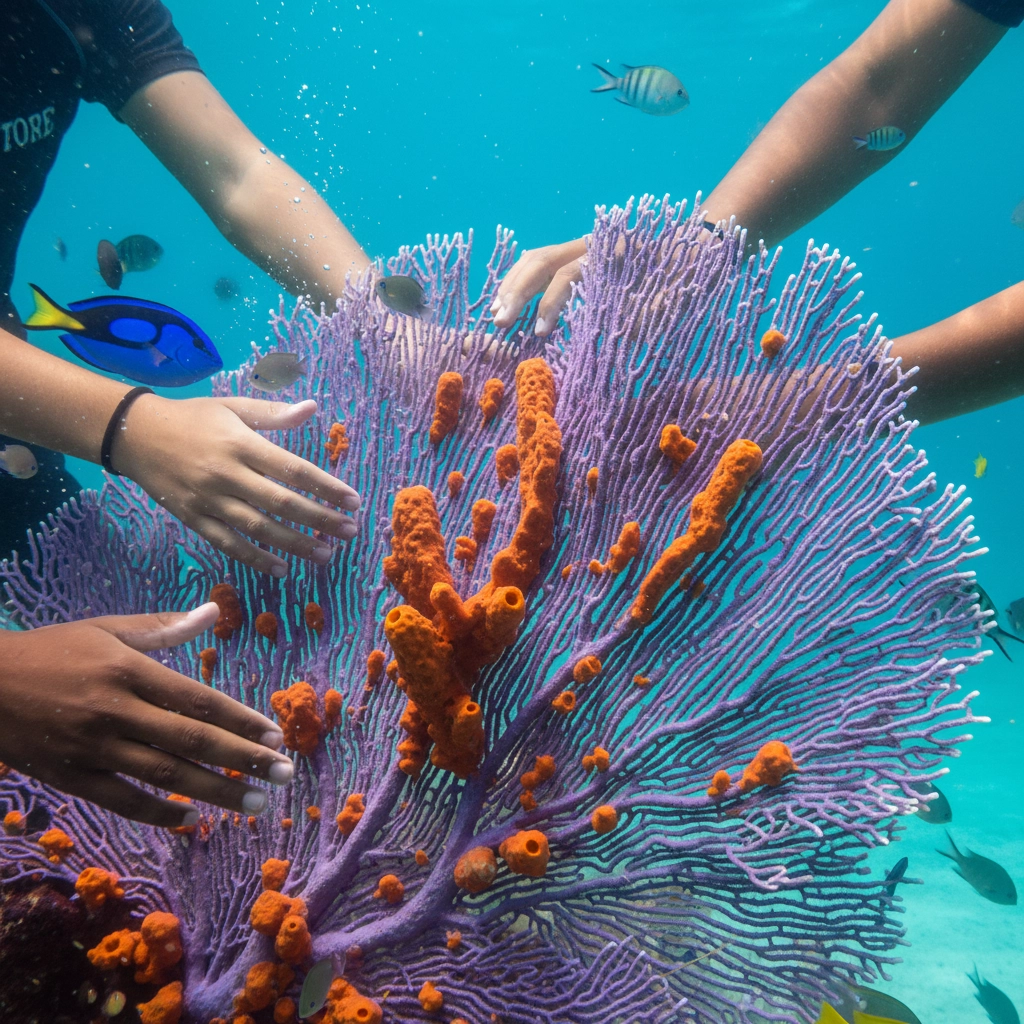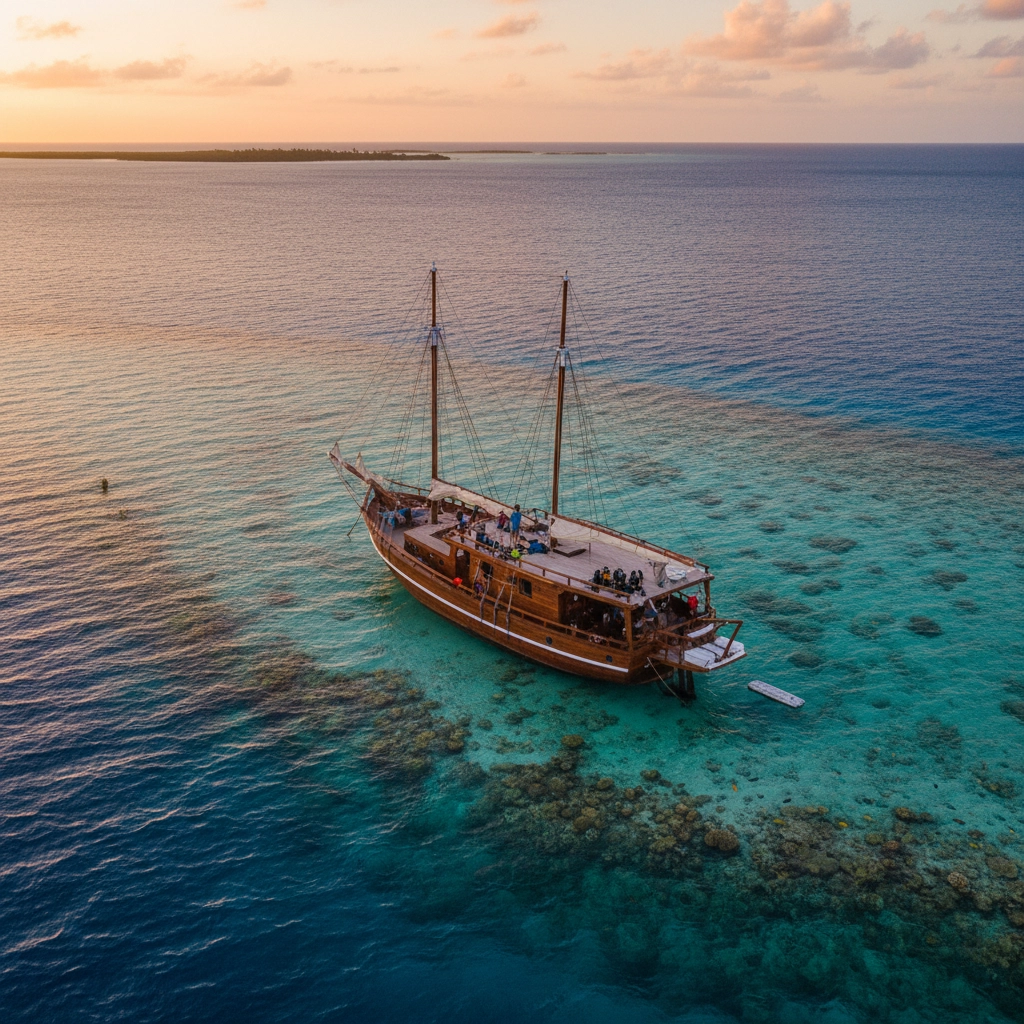Marine Science Expeditions in Belize: Dive Into Learning
- Caleb Mullenix
- Oct 23, 2025
- 5 min read
Belize presents an unparalleled opportunity for marine science education, offering students direct access to the Mesoamerican Barrier Reef: the second-largest coral reef system in the world. Educational expeditions to Belize provide students with hands-on learning experiences that transform theoretical classroom knowledge into practical understanding of marine ecosystems, conservation principles, and biodiversity research methods.
The Mesoamerican Barrier Reef: A Living Laboratory
The Belize Barrier Reef extends 190 miles along the country's coastline, encompassing diverse marine environments that serve as natural classrooms for student researchers. This UNESCO World Heritage Site includes three distinct atolls, hundreds of cayes, and extensive reef formations that support over 500 species of fish, 65 coral species, and countless invertebrate populations.
Students conducting research within this ecosystem gain exposure to multiple habitat types within a single expedition. Shallow reef environments provide opportunities to study coral polyp biology and symbiotic relationships with zooxanthellae algae. Deeper reef walls offer insights into fish behavior patterns and predator-prey relationships. Mangrove systems adjacent to reef areas demonstrate critical nursery habitat functions and coastal protection mechanisms.

The reef's accessibility enables students to conduct meaningful research projects while maintaining appropriate safety protocols. Most research sites lie within 30 minutes of established marine stations, allowing for repeated data collection visits and long-term monitoring studies that produce scientifically valuable results.
Hands-On Marine Science Activities
Coral Reef Health Assessment
Students learn standardized monitoring techniques used by marine biologists worldwide. Begin by training students to identify major coral species including brain coral, staghorn coral, and plate corals. Establish permanent monitoring transects using GPS coordinates and underwater markers. Teach students to assess coral coverage percentages, identify bleaching events, and document disease symptoms using established protocols.
Students record data on waterproof sheets, measuring coral colony diameters, documenting growth forms, and photographing specimens for later analysis. This methodology mirrors professional research practices and contributes to ongoing reef monitoring databases maintained by Belizean marine protected areas.
Fish Population Surveys
Implement point-count surveys where students position themselves at designated locations and identify fish species within specified time intervals. Train students to recognize indicator species including parrotfish, grouper, snapper, and angelfish populations that reflect reef ecosystem health.
Students learn to estimate fish sizes, record abundance data, and note behavioral observations such as feeding patterns and territorial displays. Advanced students can conduct transect surveys, swimming predetermined routes while documenting fish communities along measured distances.

Marine Invertebrate Studies
Focus student attention on invertebrate communities that serve as foundation species within reef ecosystems. Students collect and examine sponges, sea fans, sea urchins, and crustaceans while learning identification techniques and ecological functions. Emphasize the importance of non-invasive sampling methods and proper specimen handling protocols.
Students investigate symbiotic relationships, such as cleaner shrimp stations and anemone-crab partnerships, developing understanding of complex ecological interactions through direct observation.
Water Quality Analysis
Teach students to measure critical parameters including temperature, salinity, pH levels, dissolved oxygen, and turbidity using field equipment. Students learn to interpret data in relation to coral health and marine organism survival requirements. Compare readings between different reef zones and relate findings to environmental stressors including coastal development and climate change impacts.
Students maintain daily monitoring logs and learn to identify trends that indicate ecosystem changes over time.
Biodiversity Documentation and Research
Underwater Photography and Videography
Students develop documentation skills using underwater cameras and video equipment to create permanent records of marine life encounters. Establish protocols for photographing specimens, including proper positioning, lighting techniques, and scale references for size documentation. Students learn to organize digital files systematically and create identification databases for future reference.
Advanced students can produce educational videos documenting specific species behaviors or conservation challenges, developing communication skills while reinforcing scientific learning.
Species Identification Workshops
Conduct daily identification sessions where students use field guides and underwater photography to confirm species observations. Students learn taxonomic classification systems and practice using dichotomous keys to identify unfamiliar organisms. Create student-generated species lists for each diving location, encouraging healthy competition while building comprehensive site inventories.
Students develop expertise in recognizing morphological variations within species and understanding adaptive features that enable survival in specific reef environments.

Educational Benefits and Learning Outcomes
Scientific Method Application
Marine science expeditions provide authentic opportunities for students to formulate research questions, design experiments, collect data, and analyze results within real scientific contexts. Students experience the iterative nature of scientific research, learning to modify hypotheses based on field observations and data collection challenges.
Students develop critical thinking skills by comparing their findings with published research and identifying factors that may influence data interpretation. This process strengthens understanding of scientific rigor and the importance of peer review in validating research conclusions.
Environmental Awareness and Conservation Ethics
Direct exposure to reef ecosystems experiencing environmental pressures develops student appreciation for conservation principles and sustainable resource management. Students witness climate change impacts firsthand, including coral bleaching events and altered species distributions, fostering personal connections to global environmental challenges.
Students learn about marine protected area management strategies and community-based conservation initiatives, understanding the complex relationships between human activities and ecosystem health.
Cross-Curricular Connections
Marine science expeditions integrate multiple academic disciplines, reinforcing learning across subject areas. Students apply mathematical concepts through data analysis and statistical interpretation. Geography skills develop through navigation training and habitat mapping exercises. Chemistry knowledge deepens through water quality analysis and understanding of carbonate chemistry in coral reef systems.
Students practice technical writing through research reports and develop presentation skills by sharing findings with peers and expedition leaders.
Safety Considerations and Risk Management
Ensuring student safety during marine science expeditions requires comprehensive preparation and adherence to established protocols. All students must demonstrate basic swimming competency and complete orientation sessions covering marine safety procedures, emergency protocols, and proper equipment usage.
Establish buddy system protocols for all water activities and maintain appropriate instructor-to-student ratios based on experience levels and environmental conditions. Provide comprehensive briefings covering marine life encounters, including appropriate responses to potentially dangerous species and techniques for avoiding harmful interactions.
Implement weather monitoring procedures and establish clear criteria for activity modifications based on sea conditions, visibility, and other environmental factors that may affect student safety.

Long-Term Impact and Career Development
Students participating in marine science expeditions frequently report increased interest in marine biology careers and environmental science academic programs. The combination of hands-on research experience and exposure to working marine scientists provides valuable career guidance and professional networking opportunities.
Many students continue marine science studies in college and pursue advanced degrees in marine biology, oceanography, and marine conservation fields. The practical research skills developed during Belize expeditions provide competitive advantages in academic applications and internship opportunities.
Alumni of marine science expedition programs often return as volunteer assistants, creating mentorship opportunities and reinforcing the educational value of peer teaching relationships.
Belize marine science expeditions offer transformative educational experiences that combine rigorous academic learning with adventure and cultural immersion. Students return with enhanced scientific knowledge, increased environmental awareness, and practical research skills that serve as foundations for continued learning and career development in marine science fields.
The unique combination of accessible research sites, diverse marine ecosystems, and established educational infrastructure makes Belize an ideal destination for student marine science expeditions that prioritize both safety and meaningful learning outcomes.



Comments